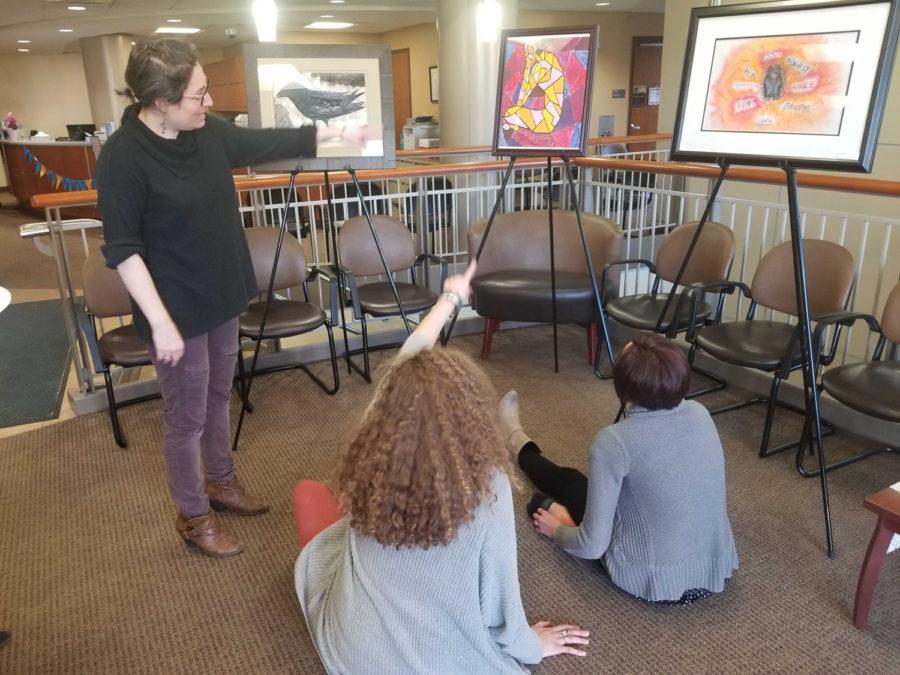Wellness Center displays ‘The Art of Recovery’ gallery
Tamara Alchoufete | Contributing Writer
The Renfrew Center had a pop-up gallery in the Wellness Center of Nordenberg Hall, showcasing artwork by women battling eating disorders.
March 27, 2019
A trip to the lobby of the Wellness Center at Nordenberg Hall will most often warrant the sight of sneezing, bruised or sweating students, slouching in the waiting room chairs, hoping to see a doctor during walk-in hours. But on Tuesday, the Wellness Center had a little more to offer — art celebrating the beauty of eating disorder recovery.
This gallery was presented by The Renfrew Center Foundation, a national eating disorder treatment organization with centers open to women of all ages throughout the country since its founding in 1985. Today, there are more than 20 locations ranging from Los Angeles to right here in Pittsburgh, with one office in North Oakland.
It was actually the Philadelphia branch of The Renfrew Center that held this pop-up gallery as part of its “The Art of Recovery” traveling exhibit. “The Art of Recovery” is a continuous art project maintained by The Renfrew Center of Philadelphia that showcases the experiences of women with eating disorders through their artwork.
The gallery itself was located in an intimate space that pushed people into a conversation. Fifteen canvases were propped up on tall wire easels spanning the balcony area of the Wellness Center lobby. The ages of the artists ranged between 17 and 50. All pieces had little cards in the corners of them stating the name and age of the woman who created it. Some had titles and descriptions, while others did not.
There was one piece called “The Table” that various attendees were observing closely throughout the event. The artist represented themselves at the dining room table during a meal with their family. The description explained that this piece was the answer to the question, “When you found yourself in a dark place, what did you need?” The artist had drawn a blow horn and written, “I think I would have been heard if I had that then.”
The project originated from the mind of Sondra Rosenberg, a board-certified registered art therapist and the center’s creative arts therapy supervisor. She began collecting the artwork of women she worked with in 2007 whom she had seen express their emotions through creative processes. The collection started out fairly small at a dozen pieces and now consists of more than 150.
“The goal is to highlight pieces that speak to different aspects [of recovery] and give all those women a voice,” Rosenberg said, “to create a different representation of eating disorders by making a visual entryway.”
The two-hour event consisted of art-viewing, interpretations of the artwork and presentations by two Renfrew Center alumni from the Philadelphia branch, Jessica McCroy and Erin Fuller, who was the first-ever person admitted to the center. They spoke about their experiences at The Renfrew Center and what impact art therapy had on their journey.
McCroy had travel journals on display for exhibit-goers to look through and talk to her about. They were created with many different materials such as envelopes and fabrics. Examining the journals shows that no single page is identical to another. One provided pockets to hold in little objects while another was a page containing nothing but a single word like “today.”
When discussing how daily art therapy impacted her experience at The Renfrew Center, McCroy remembered her experience with only positive thoughts.
“The art room was a treat and a way to escape from the everyday treatment,” she said.
She expressed how her love for art has continued, and that she still maintains a running collection of countless supplies.
After Fuller presented her own piece of artwork, which depicted a stained glass silhouette symbolizing her recovery as she pieced herself back together, she shared her love and gratitude for the artwork and the experience of art therapy.
“Artwork is very personal and every person’s experience is different. You can’t look at someone and guess [what they’re going through],” she said.
She was the first person to be admitted to the Pittsburgh branch of The Renfrew Center and is always eager to travel the country and speak about her experiences there.
The Renfrew Center exists to help patients make it through one of the toughest mental and physical disorders anyone can go through. However, therapists like Rosenberg believe true recovery goes beyond just physically feeling better.
“It’s not about feeling better, but getting better at feeling,” Rosenberg said, repeating one of the mantras of Renfrew.



